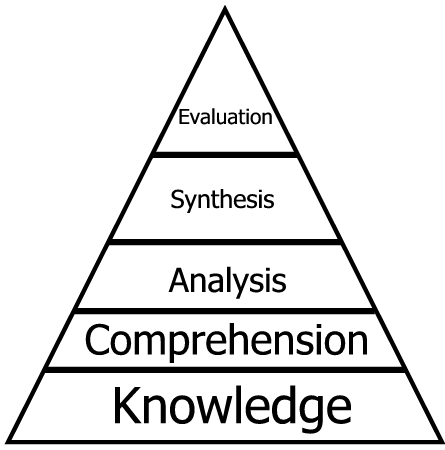What is Bloom’s taxonomy? How do teachers use it?
Bloom’s taxonomy was created by a group of psychologists in 1956, with Benjamin Bloom at the helm. A mechanism for the classification and categorization of different levels of learning, teachers can apply the six-staged diagram’s principles to intellectual learning in the typical classroom environment. So, what are these six stages, and how can teachers address them all within their lessons?
The six levels of bloom’s taxonomy, in order (lowest to highest), are knowledge, comprehension, application, analysis, synthesis and evaluation. All of these stages slot into the cognitive domain, which relates to how the brain processes information and thoughts.
Knowledge, the bottom level, is the ability to show memory of topics that have been studied in the past, by recalling facts; using related terminology; knowing patterns and trends; and having an awareness of different attitudes and theories on the subject.

To progress from here, the ability to make comparisons through pinpointing similarities and differences is required, whilst being able to interpret information more readily – comprehension. The third stage, application, requires the pupil to use pre-learned information in a slightly different way, perhaps by applying it within a variety of new circumstances.
Analysis is a key stage – a platform that enables students to access the higher-end of bloom’s taxonomy. Information must be looked at and broken down – rather like picking something apart. By doing this, reasons for an event and new evidence to support it happening can be unveiled.
The next stage, synthesis, takes things that extra step further. Here, it is demanded that the pupil uses more of their own initiative, introducing their own ideas to provide solutions to a problem. This requires planning, through which the student has to consider how best to put together pieces of information.
Finally, the highest level of this classification is applied: evaluation. This typically involves looking at other people’s ideas, and being a critique of them – in addition to assessing your own perspective. Evaluating something is about making judgments, based on a given brief, theory or statement. Here, it’s essential that the student gives reasons for and against – making a more balanced argument than is required further down the pyramid.
Check out our Bloom’s Taxonomy Verbs. They will come in handy when writing lesson plans.
In some exercises, it’s all too easy to focus only on the lower end principles. By asking students to learn facts about motives for WWI and then answer simple questions on these motives, you’re only really addressing the stages of knowledge and comprehension. To ensure that the student not only knows, but will retain information on the subject, you must challenge them. In this case, they should think more carefully about the reasons behind the start of the fighting, choosing influential people and analyzing their decisions. To achieve the highest level, and ensure the key information is retained for the long run, ask them to give reasons why in their evaluations. Then, your lesson will have maximum productivity for those participating.
As a whole, bloom’s taxonomy stresses the need for teachers to encourage the use of high-level skills amongst pupils – not simply the lower-level ones. By doing this, information is retained for longer by the student, whereas simply addressing the basics is likely to result in the key facts being forgotten soon after they’re taught.





